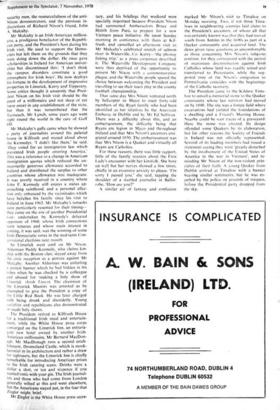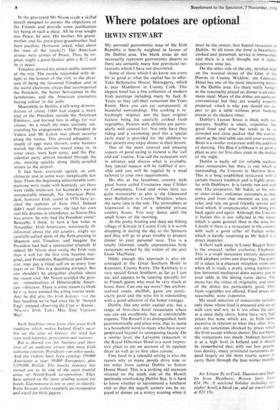All hail to Mr FitzNixon
LIAM HOLTRICAN
Two days before President Nixon's arrival in Ireland (3 October), Simon Dee failed to appear at the official opening of a Dublin shopping centre. He had agreed to perform the ceremony but decided, a statement said. that in view of North-South relations it was not safe for him or anyone else to travel in any part of Ireland. President Nixon kept a cooler head and duly landed at Shannon to what an inventive American radio com- mentator described at the time as a rousing Irish welcome. Four thousand enthusiastic citizens he guesstimated, packed every open spot, while the lucky ones surged around the President and reached out to touch him. My own guesstimate was that four hundred turned up, with a like number of reporters and cameramen. Of these a ma- jority had taken up their position on a convenient balcony but were encouraged to descend to the tarmac by members of the Presidential staff and/or the Secret Service. American flags were pressed on those who wanted them, and a pretty genial welcoming party was constituted by the time Mr Nixon emerged from Air Force One. If at this point there was a surge -it was surely initia- ted by the President himself, for he plunged into the crowd and seized every hand on offer with the air of a man used to working for his audience and glad to find a good- natured one, however small. (They have the most vigorous handshakes of any pennle going,' he said later, according to a press communique. 'I thought I was going to lose an arm.') In Limerick, half-an-hour's drive from Shannon, there was a civic reception. Here. according to a White House spokesman. the entire population turned out. This would make Limerick a very small town indeed. A certain strain was evident in the proceed- ings. attributable to the ubiquity oi the security men, the exasperation which the Irish police felt about the high style of these
security men, the resourcefulness of the anti- Nixon demonstrators, and the previous in- discretions of Richard Nixon's friend, John A. Mulcahy.
Mr Mulcahy is an Irish-American million- aire, a prodigious benefactor of the Republi- can party, and the President's host during his Irish visit. He used to support the Demo- crats but left them on the grounds that they were doing down the dollar. He once gave scholarships in Ireland for American univer- sities but discontinued this: 'I don't think the campus disorders constitute a good atmosphere for Irish boys'. He now deploys his fortune in the development of impressive properties in Limerick. Kerry and Tipperary. Some critics thought it unseemly that Presi- dent Nixon on his Irish visit should be the guest of a millionaire and not sleep or eat (save once) in any establishment of the state, hut then it was remembered that the Taoiseach. Mr Lynch, some years ago went right round the world in the care of Gulf Oil.
Mr Mulcahy's gaffe came when he showed a party of journalists around his palatial house in Kilfrush and mused aloud about the Kennedys. 'I didn't like them,' he said. They voted for an immigration law which prevented Irish people entering America.' This was a reference to a change in American immigration quotas which reduced the un- necessarily generous allowance accorded to Ireland and distributed the surplus to other countries whose allowance was inadequate. It was poorly received in a country where John F. Kennedy still enjoys a status ap- proaching sainthood, and a personal affec- tion only enhanced by the vicissitudes which have befallen his family since his visit to Ireland in June 1963. Mr Mulcahy's remarks were particularly resented for their timing— they came on the eve of another Presidential tour, undertaken by Kennedy's defeated opponent of 1960. whose Irish connections were tenuous and whose main interest in coming, it was said, was the winning of some Irish Democratic votes in the mid-term Con- gressional elections next month So Limerick went cool on Mr Nixon. Alderman Paddy Kennedy, who claims kin- ship with the Boston clan, stayed away from the civic reception as a gesture against Mr 1,fuleafy. Another Alderman was unfurling a protest banner which he had hidden in his robes when he was checked by a colleague and abused for 'making a holy show of limerick (Irish Times). The chairman of the Limerick Maoists was arrested as he attempted to give the President a copy of the Little Red Book He was later charged with being -drunk and disorderly. Young socialists and republicans also demonstrated or made holy shows.
The President retired to Kilfrush House for a traditional Irish meal and entertain- ment, while the White House press corps converged on the Limerick Inn, an extrava- gant new hotel owned by another Irish- American millionaire, Mr Bernard MacDon- agh. Mr MacDonagh runs a second estab- lishment. Dromoland Castle, which is mock- baronial in its architecture and rather a draw for sightseers, but the Limerick Inn is chiefly remarkable for introducing American prices to the Irish catering scene. Drinks were a dollar a shot, or ten and sixpence if you wanted tonic with your gin. The Irish journal- ists and those who had come from London generally wilted at this and went elsewhere, but the Americans stayed put, in the fear that Ziegler might brief. Mr Ziegler is the White House press secre-
tary. and his briefings that weekend were specially important because President Nixon had summoned Ambassadors Bruce and Habib from Paris to prepare for a new Vietnam peace initiative. I-Fe spent Sunday morning in conference with them at Kil- frush. and cancelled an afternoon visit to Mr Mulcahy's celebrated stretch of salmon river in Waterville, Co. Kerry---'the phoney fishing trip,' as a press corpsman described it. The Waterville Development Company were thus deprived of the opportunity to present Mr Nixon with a commemorative plaque, and the Waterville people spared the choice between welcoming the President and travelling to see their team play in the county football championship.
That same day Mrs Nixon ventured north by helicopter to Mayo to meet forty-odd members of the Ryan family who had been identified as her relatives by the American Embassy in Dublin and by Mr Ed Sullivan. There was a difficulty about this, and an embarrassment, the difficulty being that Ryans are legion in Mayo and throughout Ireland and that Mrs Nixon's ancestors emi- grated around 1850. The embarrassment was that Mrs Nixon is a Quaker and virtually all Ryans are Catholics.
For these reasons, there was little rapport, little of the family reunion about the First Lady's encounter with her kinsfolk. She bore up well but her nerves showed a few times, chiefly in an excessive anxiety to please. 'I'm sorry I passed you,' she said, tapping the shoulder of a startled journalist in Bailin- robe. 'How are you?'
A similar air of fantasy and confusion
marked Mr Nixon's visit to Timahoe on Monday morning. Two, if not three Titna- hoes in neighbouring counties laid claim to the President's ancestors, of whom all that was certainly known was that the had moved south from Antrim in the I690s as part of a Quaker community anti acquired land. The dates given raise questions as uncomfortable as those concerning Mrs Nixon's religious position. for they correspond with the period of maximum discrimination against Irish Catholics whose land was readily seized and transferred to Protestants, while the sug- gested time of the Nixon's emigration to Pennsylvania coincides with the beginnings of the Catholic recovery.
The President came to the Kildare Tima- hoe to unveil a memorial stone to the Quaker community whose last survivor had moved on by 1800. The site was a lumpy field where excavations had yielded the foundations of a dwelling and a Friend's Meeting House. Nearby could be seen traces of a graveyard. Here the stone was erected. Its design offended some Quakers by its elaboration, but for other reasons the Society of Friends in Ireland was not officially represented. Several of its leading members had issued a statement saying they were 'greatly disturbed by the involvement of the United States of America in the war in Vietnam', and re- minding Mr Nixon of the non-violent prin- ciples of their faith. A young Quaker from Dublin arrived at Timahoe with a banner bearing similar sentiments, but he was ex- pelled by the police on grounds of trespass, before the Presidential party dropped from the sky.
In the graveyard Mr Nixon made a skilful speech designed to answer the objections of the Friends and provide some justification for being in such a place. All he ever sought was Peace, he said. His mother, his grand- mother and his great-great-grandmother bad been pacifists. (Someone asked, what about the men of the family?) The American armies were armies of Peace. Thus, he im- plied, might a good Quaker pilot a B-52 and be at peace.
Timahoe proved the easiest public moment of the trip. The people responded with de- light to the honour of the visit, to the pleas- sure of being the favoured Timahoe ,and to the weird electronic circus that accompanied the President, the Secret Servicemen in the farmhouses, and the American journalists buying colour in the pubs.
Meanwhile in Dublin. a left-wing demons- tration of about 1,000 had staged a mock trial of the President outside the American Embassy, and burned him in effigy for war crimes. As a result the main curiosity sur- rounding his engagements with President de Valera and Mr Lynch was about security along the routes. This proved adequate: a couple of eggs were thrown, some banners waved, but the activists stayed away or, in some cases, were kept away, and the Pre- sidential party almost sneaked through the city, moving quickly along thinly-peopled streets to the airport.
It had been, everyone agreed, an anti- climactic and in some ways inexplicable few days. From the beginning unfavourable com- parisons were made with Kennedy, yet these were really irrelevant, for Kennedy's was an unrepeatable triumph. No American Presi- dent. however Irish, could in 1970 have ex- cited the raptures of June 1963. Ireland didn't need circuses now, she had her own real-life dramas in abundance, as Simon Dee was aware. So why had the President come? Basically, I think, to turn a few votes in November. Irish-Americans, notoriously ill- informed about the old country, might see carefully-edited shots of the flesh-pressing in Shannon and Timahoe, and imagine the President had had a spectacular triumph. If indeed Mr Nixon does swing the Irish vote then it will for the first time become mar- ginal, and Presidents, Republican and Demo- crat, may pay a ritual call on us every four years or so. This is a daunting prospect. But one shouldn't be altogether churlish about the recent visit. Mr Nixon avoided the gros- ser mtimentalities of Hibernophile Ameri- can noliticians. There is some reason to think he may have assisted the ailing tourist trade. And he did give the Irish Indeper tent the best headline we've had since the Sk 'lbereen Eagle stopped observing the Czar of Russia : `Nixon's Irish Talks May End Vietnam War'.
Such headlines stem from that great lrish tradition which makes Ireland God's sacri- fice on the altar of history: the land has seen such injustice, persecution and sorrows.
But a shrewd eye for business and their love of an audience ensure that most Irish. welcome tourists, Presidents—or other ranks. And the visitors have been coming: 170.000 Americans a year. 90,000 Europeans, plus 1,178,000 British. The tourist industry has turned out to be one of the most fruitful areas of North-South co-operation. They have agreed on the same grading system for hotels. Gastronomy is not so easy to classify. Irwin Stewart writes regularly on restaurants and travel for Irish papers.
























































 Previous page
Previous page